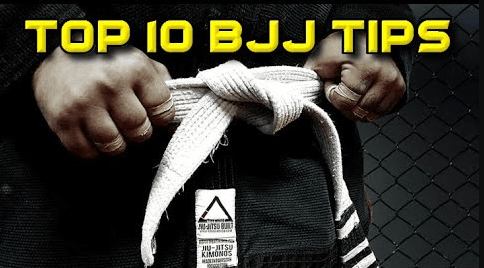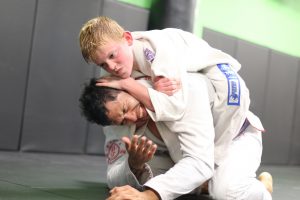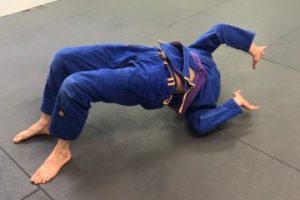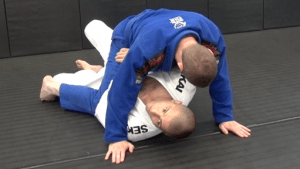
Professor Gustavo Gasperin, 3rd degree BJJ Black Belt is talking about the top 10 BJJ tips for white belts and beginners. These tips are going to help you to become a better student, stay safe and healthy on the mats, and stick with your Jiu-Jitsu for the long run.
1. Be a good drilling partner
Allow your partner to drill the techniques and learn the mechanics without offering too much resistance. A lot of time students trying to resist and counter the techniques they’re just learning. You have to find the balance between too much resistance and too little. If you offer too little resistance it is unrealistic, and some of the positions don’t even look right.
2. Tap on your partner, not on the mat
This is a big one especially if you’re rolling against another beginner. When you’re rolling against a more experienced partner, he’s been in that position or submission hundreds of times, so he knows he’s applying the submission, and he knows that you are about to tap. That’s not the case when you’re rolling with another beginner.

3. Don’t wait until it hurts
As a beginner, you’re still discovering the limits of your body. Sometimes we can not even know if we are caught in a submission or not. So don’t wait too long, just tap. Even if you don’t know if the submission is there.
If it’s hurting it’s already damaging so tap early and tap often. Sometimes it’s not hurting enough and you think you can escape, and tough enough, but most of the time you’re gonna stay out of the gym for weeks or even months, it’s not worth it. You have to know that there are some submissions that actually don’t hurt that much, like toeholds and heel hook, you don’t feel to much pain, but when you already feel it, it may be too late. You have to be very careful.
4. Master the bridge and the hip escapes
These are the two most important movements to master in order to create a great escaping game. If you’re a beginner, you’re gonna find yourself under side control and mount control quite often.
The bridge and the hip escape are the foundation for most of the escapes. You’re gonna use the bridge to off-balance your opponent, and the hip escapes to create separation between you and your opponent. So, the better you are at these two movements the easier to escape. Drill all the possible variations of the hip escapes and all the variations of bridges. All of these drills will help you to improve your escaping game.
5. There is no magic pill
What’s the secret to becoming good at Jiu-Jitsu? We can often hear this question. Like in other things in life it takes persistence, resilience, confidence, dedication, commitment, show often up to classes…That’s how you get good at Jiu-Jitsu.
It can be very complex and overwhelming at times even after you receive your black belt you still think that you don’t know enough. Most think that when they get the black belt they’ve to go all the things figure out, that’s not correct. You’re just starting to develop a deeper understanding, it’s a life long journey. Don’t get that true belt and promotions just keep showing up, train hard, dedicate yourself and you will progress. Remember Hard work beats talent!
6. Slow is smooth, and smooth is fast
When you’re drilling a technique make sure you don’t skip any steps. If you forget some of the steps ask your instructor for help.
Drill them slowly so the correct moderate skills and modern patterns are ingrained. Quality reps are more important than quantity. Once you have been able to execute the move perfectly several times then you can start adding some speed to it. As long as they’re maintaining the perfect form, give your body and your nervous system time to adapt to these new techniques.
7. Master how to do break falls and forward/backward rolls
These are the two most important drills and skills to master in order to prevent injuries in Jiu-Jitsu. Learning how to break fall in Jiu-Jitsu is absolutely crucial, otherwise, you’re gonna get hurt sooner or later. Also, it is an important skill to have in your daily life.
Learning how to do the forward and backward rolls are also super important for your safety. Learn how to tuck your chin in rollover your shoulders is gonna save your neck and your spine from terrible injuries. You are going to execute those rules when you’re sweeping or you’re getting swept by someone for example.
8. Be open-minded
The more you know the better. Learn all the aspects of Jiu-Jitsu, Gi, No-Gi, top game, bottom game, takedowns, leglocks, self-defense…
Sure, you gonna have your preferences but you don’t want to have huge holes in your games, especially when you start getting better in moving closer to the black belt. Start earlier, start learning and studying all aspects of Jiu-Jitsu.
Also, they are many students that try to apply all that their coach teaches them. What they didn’t understand is that what may work for one type of person or body type, may not work with another. If some technique that they are teaching works for you, that’s great. But if not, at least make sure that you have tried it, understand the basics of it and maybe come back to it another time.
9. Don’t compare your progress to others
You are unique, and you have your own journey. Some people train three times a week, other trains three times a day. Also, some people are young and athletic, and some are old and not in really good shape.
10. Don’t let your emotions take over
Especially when you’re in a bad position if you panic or let your opponent know that you are tired or feeling uncomfortable. An experienced opponent will know that and he will take advantage of that and make things even worse for you, eventually overwhelming you and tapping you out.
Train your mind to stay calm and relaxed while you’re in those bad positions. It’s too easy to feel claustrophobic and panic and this happens to everybody, but that’s just a part of the training. When you panic you won’t be able to use the techniques. To use the techniques your mindset has to be in a proper place, stay without emotions when you are in those bad positions. If you let all those bad feelings and bad thoughts get into your mind then it’s very hard to reverse it.


![Darce Choke Encyclopedia – Origins, Mechanics and Variations [2024] BJJ, choke, Brabo, BJJ Darce Choke, D'arce Choke, Darce BJJ Choke](https://bjj-world.com/wp-content/uploads/2017/11/JungPoirierLeeYahoo-218x150.jpg)















![Shotgun Aoki Locks Mateusz Szczecinski DVD Review [2025] Shotgun Aoki Locks Mateusz Szczecinski DVD Review](https://bjj-world.com/wp-content/uploads/2025/03/shotgun-aoki-locks-mateusz-szczecinski-dvd-review-218x150.png)


![Upper Body Chain Attacks Janine Mocaiber DVD Review [2025] Upper Body Chain Attacks Janine Mocaiber DVD Review](https://bjj-world.com/wp-content/uploads/2025/03/upper-body-chain-attacks-janine-mocaiber-dvd-review-218x150.png)
![The Empty Half Guard Michael Currier DVD Review [2025] The Empty Half Guard Michael Currier DVD Review](https://bjj-world.com/wp-content/uploads/2025/03/empty-half-guard-michael-currier-dvd-review-218x150.png)


![Finish on the Back Ethan Crelinsten DVD Review [2024] Finish on the Back Ethan Crelinsten DVD Review](https://bjj-world.com/wp-content/uploads/2024/10/finish-on-the-back-ethan-crelinsten-dvd-review-100x70.png)
![Woj Lock the World Chris Wojcik Ankle Locks DVD Review [2024] Woj Lock the World Chris Wojcik Ankle Locks DVD Review](https://bjj-world.com/wp-content/uploads/2024/12/woj-lock-the-world-chris-wojcik-dvd-review-100x70.png)


![The Closed Guard Malachy Friedman BJJ DVD Review [2025] The Closed Guard Malachy Friedman BJJ DVD Review](https://bjj-world.com/wp-content/uploads/2025/01/closed-guard-malachy-friedman-bjj-dvd-review-100x70.png)

![Jeff Glover DVD Bundle Review: Chokin’ Around With Uncle Jeff [2024] Jeff Glover DVD Bundle Review: Chokin' Around With Uncle Jeff](https://bjj-world.com/wp-content/uploads/2024/10/jeff-glover-dvd-bundle-review-chokin-around-100x70.png)
![Daisy Fresh WHITE BELT Wrestling Curriculum DVD Review [2024] Daisy Fresh WHITE BELT Wrestling Curriculum DVD Review](https://bjj-world.com/wp-content/uploads/2024/10/daisy-fresh-white-belt-wrestling-curriculum-review-100x70.png)





![Neil Melanson DVD Bundle Review: Filthy Brutal No Good Attacks [2024] Neil Melanson DVD Bundle Review: Filthy Brutal No Good Attacks](https://bjj-world.com/wp-content/uploads/2024/10/neil-melanson-dvd-bundle-review-filthy-attacks-100x70.png)
![BJJ Foundations Mikey Musumeci DVD Bundle Review [2024] BJJ Foundations Mikey Musumeci DVD Bundle Review](https://bjj-world.com/wp-content/uploads/2024/09/bjj-foundations-mikey-musumeci-dvd-bundle-review-100x70.png)
![Miko Hytonen Lapel Chokes From Everywhere DVD Review [2024] Miko Hytonen Lapel Chokes From Everywhere DVD Review](https://bjj-world.com/wp-content/uploads/2024/10/miko-hytonen-lapel-chokes-from-everywhere-dvd-review-100x70.png)



![Position And Submission Escapes Craig Funk DVD Review [2025] Position And Submission Escapes Craig Funk DVD Review](https://bjj-world.com/wp-content/uploads/2025/02/position-and-submission-escapes-craig-funk-dvd-review-100x70.png)
![Double Sleeve Guard Jon Thomas BJJ DVD Review [2024] Double Sleeve Guard Jon Thomas BJJ DVD Review](https://bjj-world.com/wp-content/uploads/2024/10/double-sleeve-guard-jon-thomas-bjj-dvd-review-100x70.png)



![Standing Leg Entries Alex West DVD Review [2025] Standing Leg Entries Alex West DVD Review](https://bjj-world.com/wp-content/uploads/2025/03/standing-leg-entries-alex-west-dvd-review-100x70.png)



![No-Gi Pressure Mastery JT Torres DVD Review [2024] No-Gi Pressure Mastery JT Torres DVD Review](https://bjj-world.com/wp-content/uploads/2024/10/no-gi-pressure-mastery-jt-torres-dvd-review-100x70.png)